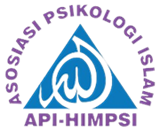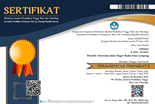Pengaruh Pelatihan Aku Dan Targetku Terhadap Motivasi Belajar Matematika Pada Siswa SMP “X”
Abstract
This study aimed to determine the effect of the training called “Me and My Target” on the motivation of learning Mathematics in 36 second grade students of "X" Middle School. The data was collected through Mathematics Learning Motivation Scale, interviews, and observations. This study used a pretest-posttest control group design (18 students as the experimental group and 18 students as the control group). This research was based on quantitative and qualitative analysis. Quantitative analysis was carried out using the Mann-Whitney test in order to determine student motivation in terms of learning Mathematics after had the training “Me and My Target”. Qualitative analysis is obtained through observation, interviews, and worksheets. The results of this study showed that there is a significant differences in student motivation to learn Mathematics between the experimental group and control group (Z = -3,216, p <0.05). Furthermore, there were also significant differences in the student motivation between the experimental group and control group within two weeks after training (Z = -3,876, p <0.05). In conclusion, the training called “Me and My Target” may increase the student motivation to learn Mathematics of second grade students of SMP "X".
Keywords
Full Text:
PDFReferences
Ancok, D. 2002. Outbond Management Training. Yogyakarta:UII Press
Ariyani, D & Supriyanto, S. 2003. Peningkatan Efektivitas Tim Kerja Asuhan Keperawatan Melalui Metode Arung Alam. Jurnal Administrasi, Kebijakan, Kesehatan, 1(3), 140-145
Azwar, S. 2004. Metode Penelitian. Yogyakarta: Pustaka Pelajar
Azwar, S. 2013. Penyusunan Skala Psikologi. Edisi 2. Yogyakarta: Pustaka Pelajar
Bates, R. 2004. A Critical Analysis Of Evaluation Practice: The Kirkpatrick Model And The Principle Of Beneficence. Evaluation And Program Training Journal, 27 (4), 341-347
Departemen Pendidikan Nasional. 2008. Analisis SI dan SKL Mata Pelajaran Matematika SMP/MTs untuk Optimalisasi Tujuan Mata Pelajaran Matematika. Yogyakarta: Tim Penulis
Elliot, A. J., et all. 2005. Achievement goal, performance contingencies, and performance attainment: An experimental test. Journal of educational psychology, 97 (4), 630-640
Johnson, D.W & Johnson, F.P. 2001. Joining Together: Group Theory and Group Skills. Boston: Allyn & Bacon.
Locke, E.A., et all. 1981. Goal Setting And Task Performance:1969-1980. Psychology Buletin, 90, 125-152
Locke, E. A., & Latham, G. P. (2002). Building A Practically Useful Theory Of Goal Setting And Task Motivation: A 35-year Odyssey. American Psychologist, 57, 705-717.
Morisano, D., Hirsh, J. B., Peterson, J., R. O.,& Shore, B.M. 2010. Setting, Elaborating, And Reflecting On Personal Goal Improves Academic Performance. Journal of Applied Psychology, 95 (2), 255-264
Robbin, S.P. 1989. Organizational Behavior: Concept, Controversies, and Aplication.4 Edition.Englewood Cliffs, NJ: Prentice-Hall.
Seniati, L., dkk. 2005. Psikologi Eksperimen. Jakarta: Tunas Jaya Lestari.
Sukadji, S. & Singgih, E.E. 2001. Sukses di Perguruan Tinggi (Edisi Khusus). Depok : Psikologi Pendidikan Fakultas Psikologi Universitas Indonesia
Sundel, M. & Sundel, S. 2005. Behavior Change in the Human Service, Behavioral and Cognitive Principles and Applications. Fifth Edition. New York: Sage Publications.
Supratiknya, A. 1995. Komunikasi Antar Pribadi Tinjauan Psikologi. Yogyakarta: Kanisius
Supratiknya, A. 2014. Pengukuran Psikologis. Yogyakarta: Penerbit Universitas Sanata Dharma
DOI: http://dx.doi.org/10.24042/ajp.v1i1.3637
Refbacks
- There are currently no refbacks.
Copyright (c) 2019 Anfusina: Journal of Psychology











